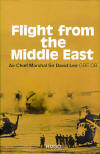 |
Published in 1980 by: HM Stationary Office,
49 High Holborn. London. WC1V 6HB Cover price:
£9.75 A concise, authoritative and highly readable
study of RAF operations in the Arabian Peninsular and adjacent
territories from 1945 to 1972. It examines in close details, the
changes in British military policies in the Middle East over 27
years and the versatility of British air power in these times. Air
Chief Marshal Sir David Lee shows how skilfully the British managed
their changing responsibilities including how the Hunter was used to
great effect in the policing of this vast desert area. |
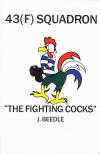 |
Published in 1985 by: Beaumont Aviation
Literature, 656 Holloway Road, London. N19 3PD Cover price:
£12.95
This book traces the history of 43 Squadron from
its inception in 1916, through the interwar years into the Second
World War, continuing into the jet age and operations as a Hunter
fighter unit at home, the Near and Middle East, to its disbandment
in 1967, before concluding with coverage of its reformation and
operations as a Phantom squadron from the late sixties onwards.
|
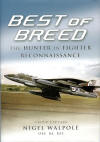 |
Published in 2006 by: Pen & Sword Books Ltd,
47 Church Street, Barnsley. Yorks. S70 2AS Cover price:
£25.00
Of the three front-line units to use the
Hunter FR.10, 1417 Flight was the only unit which took the aircraft
to war in earnest. Making good use of anecdotes and stories from
pilots who flew with the Flight, Gp Capt Nigel Walpole’s
superb account of life as a Hunter photo-recce pilot reveals how the
FR.10
came to the fore in joint operations with both the Hunter FGA.9
squadrons and
forces on the ground throughout the Aden Protectorate. The FR.10’s
extensive service in 2 TAF is also covered in great detail.
|
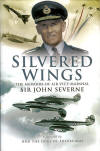 |
Published in 2007 by: Pen & Sword Books Ltd,
47 Church Street, Barnsley. Yorks. S70 2AS Cover price:
£19.99
In his book, AVM Sir John Severne recollects his
varied and distinguished career as a pilot in the RAF, including a tour in Aden where he worked in
HQ Middle East Command alongside officers from all three services.
Based at RAF Steamer Point, Sir John was responsible for the policy and
operational procedures of the Fighter, Maritime Reconnaissance and Helicopter
force in the Command, much of his time being spent working
with 8 and 43 Squadrons and 1417 Flight on their ever changing
operational briefs. |
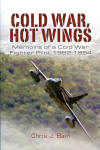 |
Published in 2007 by: Pen & Sword Books Ltd,
47 Church Street, Barnsley. Yorks. S70 2AS Cover price:
£25.00 (reduced to £15) Sqn Ldr Chris Bain recalls in fascinating
detail, his first operational posting when, as a young Flying Officer,
he flew Hunter FGA.9s with 8 Squadron at
RAF Khormaksar, Aden, taking part in the Radfan campaign and many
other
operations between 1964 and 1967. This excellent biographical
account of life as an RAF fighter pilot
during the cold war era continues with a portrayal of Chris’s
subsequent tours, flying Hunters in Germany and as OC 1417 Flight,
by then a Harrier unit in Belize. |
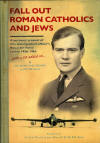 |
Published in 2008 by: Old Forge Publishing, 39 Backgate, Cowbit,
Lincolnshire. PE12 6AP
Cover
price:
£16.00
Tony Haig-Thomas joined the RAF in April 1956, training on Jet Provost and
Vampire aircraft. From 1959 to 1961 he flew Hunter, Venom and Meteor
aircraft in the Middle East and, following a disastrous low-flying
episode in Rhodesia, he became a Flying Officer with minus four
months seniority. The book ends with the author back flying Hunters
in Saudi Arabia. It is written with an immaturity that is
appropriate to his age at the time of the events and with a
self-deprecating sense of humour. Tony is currently the Aviation
Trustee of the Shuttleworth Trust at Old Warden. |
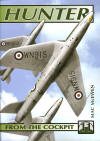 |
Published in 2009 by: Ad-Hoc Publications, Cedars, Wattisham Road,
Ringshall Suffolk. IP14 2HX
Cover
price:
£19.95
This brand new ‘From the Cockpit’ volume—the first to feature an
aircraft of the Royal Air Force—considers the Hunter from the
standpoint of the RAF and Fleet Air Arm officers who flew it and the
ground crews who serviced it. The detailed running text has been
compiled by Air Commodore Mac McEwen, who flew the Hunter in most of
its various forms and was for a period a solo aerobatic display
pilot, and fully explores the flying characteristics of the
aircraft, and there are personal contributions from a host of former
Hunter pilots and service technicians under whose charge the
aircraft operated. The book includes scores of superb photographs,
many of which are here seen in print for the first time, and dozens
of full-colour artworks, together with summaries of the aircraft’s
technical details and RAF and FAA squadron use. |
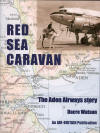 |
Published in 2008 by: Air-Britain, 41 Penshurst Road, Leigh,
Tonbridge. Kent. TN11 8HL
Cover
price:
£42.00 (reduced price for Air-Britain members)
Aden
Airways came into being in
March 1949 as a BOAC subsidiary,
inheriting six of that company’s
DC-3s
and operating initially on routes
up the
Red Sea
between
Cairo
in the
North and
Nairobi
in the
South, then into the
Protectorates and Somalia. Led by the
charismatic Richard de Graaff Hunter, the airline established
a strong presence but with old
equipment soon became less
competitive on international routes, a
situation not relieved by
the arrival of
ex-BOAC Canadair Argonauts. Not until 1963
did modern equipment, in the form
of two Viscounts arrive - too late
in effect as the political
events which resulted in
independence for Aden caused
the closure
of the
company in June 1967.
This
book by Dacre Watson charts the
background to
the formation of
the company, all
of the major events of 1949 to
1967, the people involved - many
of whom
have contributed their own
memories and photographs, the Haj flights,
carriage of the drug Qat, oil
exploration support, the formation of its
own subsidiary
Arab Airways (Jerusalem)
Ltd, and finally the ignominy of
aircraft sabotage on
the last day. Official records, log
book entries,
diaries, maps,
timetables and
airline memorabilia all feature in helping
to capture the spirit of the age
of pioneering airline
development in a most challenging
environment. |